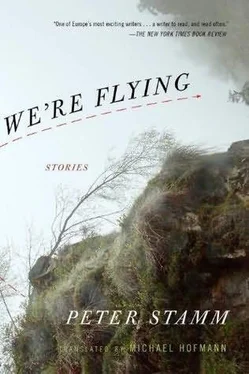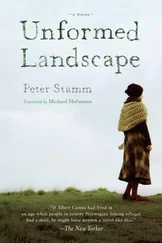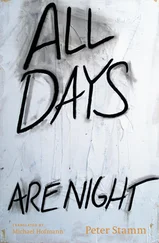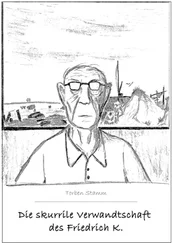YOU GIVE HIM a cloth from your paint box, a little scrap of linen you normally use to clean brushes.
Here, wipe your nose.
The way he stares at you. He wipes his nose and then wipes his neck too, as though he was sweating. But the weather is cool and he’s jacketless. It’s a gesture he must have copied from his father.
Do you live near here?
He nods and takes his cap off.
Is that your field?
He nods again, takes a step closer, and tries to take a peek into your sketchbook. His shoulders are hunched, as if in the expectation of blows. You can see in his face how the question has come about, via many detours. And then his fear of asking it. But his curiosity is too strong.
Why are you doing that, monsieur?
Why are you doing that? The most terrible of questions. The question you don’t even dare ask yourself. He doesn’t ask what you’re doing. He doesn’t seem to be stupid. He must have watched other painters.
Has he ever seen a painting? Maybe a saint in church. But a landscape? How futile it must seem to him, you standing there in his father’s field in your muddy boots, trying to capture the mouth of the river and the sea and the few houses in his village, the only one he knows.
You buy yourself off with a coin. He thanks you with a bow, and he’s gone, and you work on, quickly, so as not to miss the moment. You’ve almost missed the fishing boats in the river mouth. They’re on their way back to port.
It will rain later, and you will ask yourself where the boy is now, and whether he has a roof over his head. His question worries you. You ask yourself what quarter the clouds are coming from. Who cares? Weather is for farmers.
You are just hand and eye now. You hum a tune from Mozart, your Mozart. To paint the way he composed, with such facility and lightness. To paint in such a way that no one will ask any questions.
Why are you doing that? Because you’re a painter. Nothing else, just a painter.
WHEN YOU TRANSFERRED the sketch in your studio, when you tried to remember the light and shade, and the reflexes on the sea—were there reflexes on the sea?—and the colors and the hues, all you could think about was the boy and his question. The question you never asked yourself. Why are you doing that?
You could just carry on like that. You will carry on like that. Already you have material for a whole lifetime. Sketches. Folders full of sketches, a head full of landscapes ready to be painted. And every day there are more. Every landscape you see is a job for you. The sun rises and sets for you, the wind blows the clouds across the sky for you, the grass and the trees grow for you.
Why are you doing that? Why not? The pictures are good. You know how good they are. You love your pictures more than anything. Your little sketches. The walls of your studio are covered with them. And you love working in the open, being outdoors, contemplating landscapes, painting. Nothing but the changes in the light, the slow, almost imperceptible movement of the shadows. How irritating it always was, when you drew the street urchins in Rome and they ran off before you were finished. They left you with a load of unfinished sketches. Landscapes don’t run away.
You don’t paint them to show them off. You don’t exhibit your sketches. When your friends call on you in your studio, they want to see the big pieces you will exhibit, the landscapes with mythological or biblical scenes. They pass judgments that are baffling to you. You ignore them. You’d rather do it wrong in your way than do it right according to the prescription of those twenty people. They all know better, give you advice, as if you didn’t know that you can’t pull off the big things, and why you can’t. The biblical figures, the mythological figures, basically they don’t interest you. Your true love is for the sketches, the little mood pieces.
If you could manage to depict the moment in just the way you sensed it, so that the boy in Trouville would recognize his village. That he might see the beauty of the village, the beauty of the moment. But who cares about such things?
Old Sennegon loved sunsets. In Rouen he went walking with you every evening. He told you Bible stories, always the same ones. It was as if he needed some pretext to be with you. The stories didn’t interest you. Stories and the past—they never interested you. What interests you is the present, the moment. Father Sennegon walked two paces ahead of you, his hands crossed behind his back. He spoke slowly and thoughtfully, and suddenly he stopped and said, Look, look at the colors of the clouds. As if you had been looking at anything else anyway.
You sat down on a bench and silently watched as the sun went down. Very slowly it grew dark. The changes were barely perceptible. Then, the second the sun dipped below the horizon, everything was different. That terrible moment in which the light seems to die. You kept painting dusks, as if you wanted to stop time, to escape the certainty of death.
YOU ARE TWENTY-NINE YEARS OLD. Soon you will leave your parents and travel to Italy. You must travel to Italy, if you are serious about becoming a painter. You are looking forward to the journey, but you’re a little afraid of it too. Everything will be different. You will meet new people, sleep in strange beds, learn another language. You are thinking about the women in Rome. You have visited the rue du Pelican once or twice, but the women in Rome are different. Michallon told you stories about them. And on that occasion you were interested in stories.
You’ve bought a suitcase and clothes for the journey, a broad-brimmed hat, paints and brushes. You are prepared. In a couple of days you will leave. When you walk through Paris now, everything looks completely different. It’s as though you were seeing it for the first time, it looks fresh and exciting. The beauty of the city is frightening to you. The last look is like the first.
You paint a self-portrait. Your father requested it. He wanted you to leave a picture of yourself. He will get on better with your picture than with you. He won’t lose his temper with you for not getting up in the morning, for being absentminded, for wandering around aimlessly.
For the first time you look at yourself in the mirror with a painter’s eye. You’re not good-looking, but you like yourself. You smile. You will paint yourself smiling, with that smile with which you seduce women and drive your father white with rage. When he shouts at you and tells you to get on with it. You smile, and no one can do anything to you. You don’t shout, you just smile.
You sketch your face. You capture your likeness. You have always clung to pictures. When you were sent out on errands during your apprenticeship, you stopped in front of galleries and looked at the pictures, always the same pictures. Once, when one of them was suddenly not there—it was a study of Valenciennes—in your excitement you walked into the gallery to ask after the painting, to see it one last time. It was as though you’d lost a loved one. But then you didn’t dare. You said you’d gone in the wrong door, and you blushed and ran off.
You cling to pictures, your pictures. You don’t really want to sell them. You’ve been known to buy pictures back. They are part of you, part of your life. You look at them. They don’t change. When you put out the lights at night, you know they’re there in the dark.
If only you’d drawn Victoire, while she was alive. You’d never have been a painter without her. It broke your father when she died. After that he didn’t care what happened. He gave you the money he’d set aside for her. If you’d drawn her, she would still have been there. But drawing people, that was something you only learned to do afterward. Once you’d learned to see.
Читать дальше







![Brian Jacques - [Flying Dutchman 01] - Castaways of the Flying Dutchman](/books/128851/brian-jacques-flying-dutchman-01-thumb.webp)




